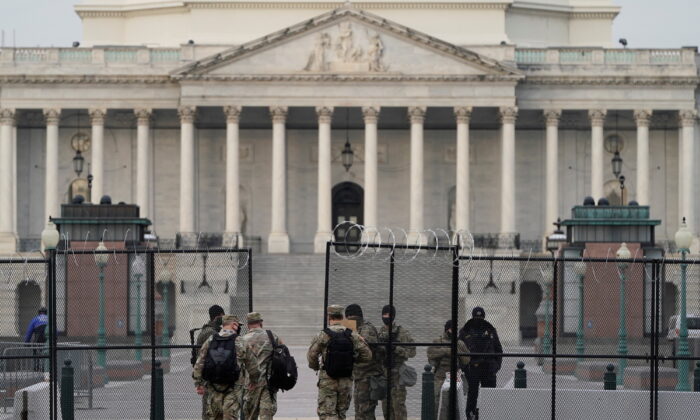The U.S. Senate voted on Feb. 9 to authorize the impeachment trial of former President Donald Trump, overruling an argument by the defense alleging the Senate doesn’t have jurisdiction to try Trump because he’s now a private citizen.
Over the course of four hours, House impeachment managers and Trump’s attorneys presented their arguments for and against the constitutionality of the trial. In the end, 44 Republican senators voted in favor of dropping the trial because it’s illegitimate, seven votes short of the majority needed to stop the proceedings at the gate.
The lead impeachment manager, Rep. Jamie Raskin (D-Md.), argued that discontinuing the trial because Trump has left office would create a “January exception,” during which future presidents could abuse their power without fear of being convicted and barred from holding future office.
“Conduct that would be a high crime and misdemeanor in your first year as president, in your second year as president, in your third year as president, and for the vast majority of your fourth year as president, you can suddenly do in your last few weeks in office without facing any constitutional accountability at all. This would create a brand new January exception to the Constitution of the United States of America,” Raskin said.
Bruce Castor, one of Trump’s attorneys, argued that the idea of a “January amnesty is nonsense.”
“If my colleagues on this side of the chamber actually think that President Trump committed a criminal offense … after he’s out of office, you go and arrest him. So there is no opportunity where the president of the United States can run rampant in January at the end of his term and just go away scot-free. The Department of Justice does know what to do with such people.”
The people who breached the Capitol haven’t been accused of conspiring with the president, Castor noted.
Rep. Joe Neguse (D-Colo.) cited two historical precedents from the U.S. Senate, including the impeachment of Secretary of War William Belknap, who unsuccessfully argued that the Senate couldn’t try him because he had already been expelled. Neguse noted that the senators at the time were outraged by the proposition and, after deliberation, voted to proceed with the trial.
“The Belknap case is clear precedent that the Senate must proceed with this trial since it rejected pre-trial dismissal, affirmed its jurisdiction, and moved to full consideration of the merits,” Neguse said.
The defense had argued, in a trial memorandum, that Belknap’s case doesn’t apply because he wasn’t a president, among other reasons.
Trump attorney David Schoen argued that the trial should be dismissed because Trump wasn’t afforded due process in the House of Representatives, which voted to impeach the president without hearing witnesses, presenting evidence, or allowing for committee deliberation. He noted that the Democrats’ rationale for rushing the proceedings fell flat, considering that they delayed sending the article of impeachment to the Senate for 12 days after adopting it.
“The House leadership unilaterally and by choice waited 12 days to deliver the article to this Senate to begin the trial process. In other words, the House leadership spent more time holding the adopted article than it did on the whole process leading up to the adoption of the article,” Schoen said.
Rep. David Cicilline (D-R.I.), another impeachment manager, argued that due process in the House wasn’t necessary and that Trump would be afforded due process in the Senate, where he will be given an opportunity to respond to evidence and was offered a chance to testify.
Both sides used video clips during their presentations. Raskin played an extended clip of the crowd breaching the Capitol interspersed with the speech Trump gave at the same time and the proceedings inside the building. The video showed that Trump was still speaking some 30 minutes away when a separate crowd breached the outer perimeter of the Capitol.
Schoen played a clip of Democrat politicians calling for Trump’s impeachment beginning in early 2017. He accused the Democrats of using the impeachment for purely partisan purposes and warned that should the trial go forward, it would set a precedent for future legislatures to go after former officials based on the partisan whims of the moment.
“Under their unsupportable constitutional theory and tortured reading of the text, every civil officer who has served is at risk of impeachment if any given group elected to the House decides that what was thought to be important service to the country when they served now deserves to be canceled,” Schoen said.
Raskin concluded his opening remarks with an emotional appeal to the Senate by describing his family’s ordeal on Jan. 6. He appeared overcome by sentiment when recalling that his adult daughter told him she never wants to visit the Capitol again.
Castor opened the defense’s arguments condemning the violence at the Capitol.
“You will not hear any of the team representing former President Trump say anything but in the strongest possible way denounce the violence of the rioters and those that breached the Capitol, the very citadel of our Democracy, literally the very symbol that flashes on television whenever you’re trying to explain that we’re talking about the United States. Instant symbol. To have it attacked is repugnant in every sense of the word. The loss of life is horrific.”
